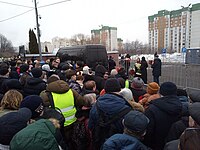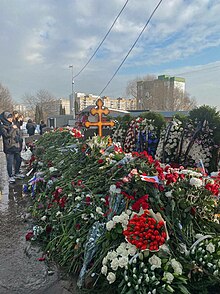Death and funeral of Alexei Navalny
[5] One report from Russia Today suggested the cause of death was a blood clot, but this diagnosis was disputed by Alexander Polupan, who had treated Navalny before.
The Polar Wolf colony has more harsh conditions, including reported torture of inmates, and according to Novaya Gazeta is reserved for "especially dangerous repeat offenders".
[27][28] On 16 February, the Federal Penitentiary Service department for the Yamalo-Nenets Autonomous Okrug published a statement that Navalny lost consciousness after a walk.
[2][3] Referring to a statement by representatives of the Labytnangi City Hospital, several Russian state-owned news agencies reported that an ambulance arrived at the scene in less than seven minutes and performed resuscitation measures for more than half an hour.
[58][59] On 26 July 2024, the Investigative Committee of Russia concluded that Navalny's death "does not have a criminal nature" and was the result of a "combined disease", which included a number of diagnoses: cholecystitis, pancreatitis, intervertebral hernia and others.
[60] Yulia Navalnaya reacted to the official conclusion of death: We know very well that when Alexei felt ill, he was taken not to the medical centre, but back to the solitary confinement cell.
The Journal noted that some European agencies were skeptical of the US assessment, finding it "doubtful that harm could have come to Navalny without the president's prior awareness" in Putin's Russia.
[10][62] On 27 February, Kira Yarmysh said that they were trying to find a place to hold a public memorial for Navalny, adding that most funeral locations they had contacted had refused to allow a ceremony on their premises.
On the same day, Vasily Dubkov, one of Navalny's lawyers who accompanied Lyudmila Navalnaya in retrieving her son's remains in Yamalo-Nenets, was reportedly arrested in Moscow on charges of "violating public order".
[64] Ivan Zhdanov, a director of the Anti-Corruption Foundation, said that the funeral had initially been scheduled on 29 February but was moved after no venue agreed to hold it on that day, which coincided with Putin's annual Presidential Address to the Federal Assembly.
The ceremony, which was streamed live on his YouTube channel, was conducted under a heavy police presence and crowd control barriers were erected around the church.
The Russian human rights group OVD-Info said that 128 people were arrested in 19 cities across the country for participating in memorial events on his funeral,[70] most of whom were trying to lay flowers at monuments to victims of Soviet repression.
He was demoted into a psalm-reader on 23 April by the Russian Orthodox Church and was banned from giving blessings and wearing a cassock for three years and was ordered transferred from his parish.
"[73][74] Navalnaya called for the EU to recognize the results of the 2024 Russian presidential election as illegitimate, stating "A president who assassinated his main political opponent cannot be legitimate by definition.
[77] Maria Pevchikh, the head of the board of the Anti-Corruption Foundation founded by Navalny, said that he would "live on forever in millions of hearts," and asserted that he was murdered.
[78] She later alleged that such an event was part of a plot by Putin to thwart the release of Navalny and two American citizens in an exchange with Federal Security Service's operative Vadim Krasikov, who assassinated former Chechen commander Zelimkhan Khangoshvili in Germany in 2019.
[80] Opposition politician Boris Nadezhdin, who unsuccessfully attempted to file his candidacy for the 2024 Russian presidential election, called Navalny "one of the most talented and bravest people in Russia I ever knew.
"[81] Mikhail Khodorkovsky, a former oligarch in exile in London, urged Russians to vote for Navalny as a write-in candidate in the 2024 presidential election as a mark of protest.
"[77] Dmitry Muratov, a Nobel Peace Prize laureate and editor-in-chief of the Latvia-based Novaya Gazeta newspaper, expressed his condolences to Navalny's family.
[116] The Russian independent media outlet Agentstvo reported that within thirty minutes of Navalny's death being announced, the ruling United Russia party issued a message to its deputies in the State Duma to "keep strictly in line with the Federal Prison Service's version [or] better to refrain from commenting at all".
[118] In response to international condemnation over Navalny's death, foreign ministry spokesperson Maria Zakharova criticized Western countries for having "its conclusions ready".
[97][121] Several other politicians and public figures, including Tina Kandelaki, Anton Krasovsky, and Sergei Markov, blamed Navalny's death on the US or the West.
[123] Margarita Simonyan, editor-in-chief of the Russian state-owned network RT, stated on Telegram that "everyone has long forgotten him [Navalny], that there was no point in killing him" since it was beneficial to "exactly the opposite forces".
[127] Direct or indirect accusations against the Russian authorities in connection with Navalny's death have been made by many leaders of Western countries and representatives of major international organizations.
[130] At least eight other instances of rallies for Navalny being broken up were reported in Belarus, Cuba, France, Greece, Italy, Thailand, Uzbekistan, and Vietnam.
"[202][203] On 17 February, Irish singer Bono of U2 led crowds in a chant of Navalny's name at his band's concert in Las Vegas, stating "Tonight, the people who believe in freedom must say his name.
[65] Hours following the announcement of Navalny's death, a group of hackers opposed to the Russian government launched a cyberattack on the online shopping service JSC Kaluzhskoe, which provides commissary needs for the Federal Penitentiary Service, defacing the website with messages supporting Navalny and lowering the price of goods sold to relatives of prisoners by inserting unauthorized discounts.
Josep Borrell, the EU foreign policy commissioner, pledged action to hold "Vladimir Putin and his regime" accountable.
[209] On 23 February, the United States announced sanctions on three Russian officials, including the deputy director of the Federal Penitentiary Service who was promoted three days after Navalny's death.
[210] On 3 March, Canada announced sanctions on six senior Russian officials working in the prosecutorial, judicial and correctional services for their involvement in Navalny's imprisonment and death.




